Lindsey Fitzharris, aka @DrLindseyFitz, is a storyteller and medical historian. In her threads and through her Youtube channel, she shares her knowledge about the surgeons who reconstructed the soldiers’ faces during WWI and how medicine was practiced in the Middle Age. She also published a first book, The Butchering Art: Joseph Lister's Quest to Transform the Grisly World of Victorian Medicine.
Interview published on June 19, 2019
Q. What words describe you the best?
A. Storyteller, historian, bon vivant!
Q. What led you to the specific field of medical history?
A. I joke that I was a strange child, and I grew up to be an even stranger adult. When I was younger, I used to drag my grandmother from cemetery to cemetery hunting “ghosts.” Some people might think I had a fascination with death, but actually, I was always fascinated with the past—and the people who lived there. Eventually, I decided to pursue a PhD in medical history at Oxford University. I think my attraction to the subject is similar to why people gravitate towards my content online: we all know what it is like to be sick. How was the experience different for people in the past? That is what I set out to explain through my work.
Q. Your first book, The Butchering Art: Joseph Lister's Quest to Transform the Grisly World of Victorian Medicine, explains how the experimentation in surgery at this period led to a lot of deaths. Do you think it was a necessary stage to further science?
A. I think it’s an uncomfortable truth about advances made in science and medicine. Unfortunately, for everything that succeeds, there are thousands of things that don’t succeed. Medicine was far less regulated in the past. This meant that doctors and surgeons were essentially experimenting on patients in ways that would likely be prohibited today. We owe a huge debt to the medical practitioners who came before us, but we owe an even greater debt to their patients who endured these painful (and often failed) treatments.
Q. What is your goal when you write these threads about medical history?
A. I consider myself first and foremost a storyteller. So, my primary goal with my content is to tell a good story. Ultimately, this guides my decision on which subjects to cover in my threads. I also hope that people come away with a deeper understanding of medical history after reading my threads
Q. Some pictures are pretty terrifying. Did you ever think of not publishing one because of this?
A. The images I use to illustrate my medical history threads can be quite visceral. But I don’t think I would be doing these stories justice if I didn’t show exactly what it was like to live and die in the past.
Q. You are working on your next book which will talk about Harold Gillies, the first plastic surgeon, if I may say. His goal was to help injured people from WWI. How was his work perceived at the time?
A. Today, Harold Gillies is recognized as the “Father of Modern Plastic Surgery.” That is to say: he wasn’t the first plastic surgeon—indeed, ancient methods of rhinoplasty date back thousands of years. But he did help usher plastic surgery into a new age, and contributed greatly to what the profession would become in the 21st century. He helped rebuild soldiers’ faces during WWI, and even in his day, his work was regarded as groundbreaking and important.
Q. How do you see the future of plastic surgery?
A. Today, most people think of breast enlargement and liposuction when they think of plastic surgery. While the field of aesthetic surgery has indeed grown, so has the field of reconstructive surgery, which addresses horrific injuries, birth defects, and more. Face transplants are a great example of this. It’s difficult to predict the future of plastic surgery when so many advances are being made every single day.
Q. Any thread authors you’d like to recommend?
A. If people are interested in medical history, I highly recommend great accounts like @Surgeonshall, @OldOpTheatre, @RCSEdarchive, @thomasngmorris, and @ExploreWellcome – to name a few!
You can learn more from Lindsey on her website and find her threads here.
____
Read other Threader’s interviews here.
Explore the deepest thoughts of Twitter - Sign up.
Download Threader on iOS.



